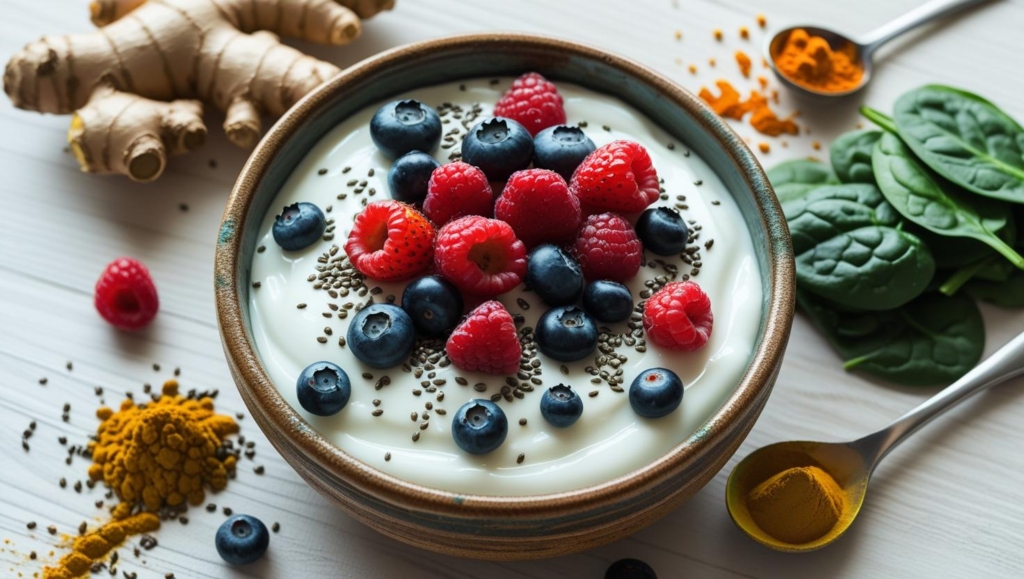32Views 0Comments

How a Healthy Gut Contributes to Weight Loss and Overall Well-being
The connection between gut health and overall well-being is undeniable, yet it’s often overlooked. In recent years, research has shown that your gut microbiome (the trillions of bacteria and microorganisms living in your intestines) plays a pivotal role not just in digestion, but in weight management, immune function, and even your mood. If you’re looking to lose weight or improve your health, focusing on gut health is one of the smartest things you can do. Let’s dive into how maintaining a healthy gut can help you reach your weight loss goals and improve your general health.
1. The Role of the Gut Microbiome in Weight Loss
Your gut microbiome is essentially a collection of bacteria, viruses, fungi, and other microorganisms that help process food and extract nutrients. A balanced microbiome promotes optimal digestion and helps regulate metabolism. In fact, an imbalance in your gut bacteria can contribute to weight gain, as it affects the way your body processes food and stores fat.
How Gut Health Impacts Weight Loss:
- Gut bacteria affect metabolism: A healthy balance of gut bacteria helps the body metabolize food efficiently, leading to improved fat-burning and nutrient absorption.
- Leptin resistance: An imbalance in gut bacteria can affect leptin, the hormone responsible for signaling satiety (fullness). This can cause overeating and weight gain.
- Improved fat oxidation: A healthy gut encourages better fat metabolism, making it easier for the body to burn fat instead of storing it.
2. Probiotics and Their Role in Weight Loss
Probiotics are live bacteria that promote a healthy gut by increasing the number of beneficial bacteria in the digestive system. Studies have shown that certain probiotic strains can help with weight loss by improving gut health and enhancing metabolism. They can also help reduce inflammation, which is often linked to obesity.

Probiotics for Weight Loss:
- Lactobacillus and Bifidobacterium: These strains of probiotics have been shown to help with fat loss and improve gut health.
- Fermented foods: Foods like yogurt, kefir, kimchi, and sauerkraut are rich in probiotics and can help boost your gut health, improving digestion and metabolism.
- Probiotic supplements: For those who have trouble incorporating probiotic-rich foods into their diet, supplements can be an effective alternative.
3. Fiber and Gut Health
Fiber is an essential component of a healthy diet, and it plays a crucial role in maintaining a balanced gut microbiome. Dietary fiber acts as food for the beneficial bacteria in your gut, helping them thrive and produce healthy by-products like short-chain fatty acids (SCFAs), which help reduce inflammation, improve gut health, and support fat metabolism.
Fiber-Rich Foods to Include for a Healthy Gut:
- Fruits: Apples, berries, pears, and citrus fruits are rich in fiber.
- Vegetables: Broccoli, spinach, kale, and carrots are excellent sources of fiber.
- Whole grains: Oats, quinoa, barley, and brown rice are great options for adding fiber to your diet.
- Legumes: Lentils, chickpeas, and beans are fiber-rich foods that help support gut health and improve digestion.
4. The Link Between Gut Health and Inflammation
Chronic inflammation is often linked to obesity, insulin resistance, and other metabolic issues. An imbalanced gut microbiome can lead to intestinal inflammation, which contributes to fat storage and weight gain. By promoting a healthy gut with probiotics and fiber, you can help reduce inflammation and improve metabolic health, making it easier to lose weight and maintain a healthy body.
How to Reduce Gut-Related Inflammation:
- Probiotic-rich foods: As mentioned earlier, incorporating probiotics helps balance gut bacteria and reduces inflammation.
- Anti-inflammatory foods: Foods like turmeric, ginger, green tea, and omega-3-rich foods (such as fatty fish and flaxseeds) help fight inflammation.
- Reduce processed foods: Highly processed foods, sugar, and trans fats can exacerbate inflammation. Focus on whole, natural foods to support gut health.
5. Improving Digestion for Better Nutrient Absorption
A healthy gut helps you absorb nutrients more efficiently. When your digestion is working properly, your body can absorb vitamins, minerals, and other nutrients from food, which is crucial for weight loss and overall health. Gut health also affects the production of digestive enzymes, which help break down food and absorb nutrients.
Improving Digestion for Optimal Nutrient Absorption:
- Chew your food: Take your time to chew food thoroughly, which helps with digestion and nutrient absorption.
- Stay hydrated: Drinking plenty of water aids digestion and prevents constipation.
- Digestive enzymes: Consider adding foods like pineapple and papaya, which contain natural enzymes that support digestion.
6. Stress and Its Impact on Gut Health
Stress can have a profound impact on gut health. When you’re stressed, your body releases cortisol, a hormone that can negatively affect your gut microbiome, leading to digestive issues like bloating, constipation, or diarrhea. Chronic stress can also trigger inflammation and slow down metabolism, making weight loss more difficult. Managing stress is essential for a healthy gut and weight management.
Stress Management Tips for a Healthy Gut:
- Mindfulness and meditation: These practices help reduce stress and improve mental clarity.
- Exercise regularly: Physical activity helps reduce stress hormones and promotes a healthy gut microbiome.
- Adequate sleep: Quality sleep is crucial for reducing stress and supporting gut health.

